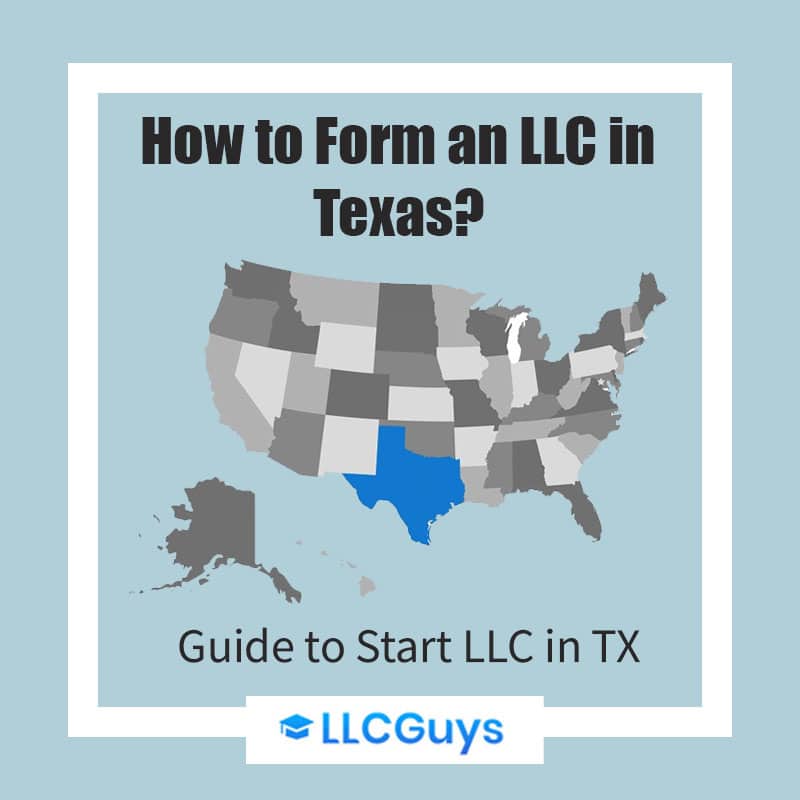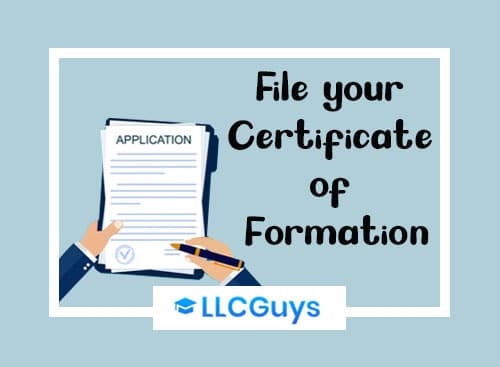How to Form an LLC in Texas? 7-Step Guide to Start an LLC in TX
Jump to Best LLC Formation Services for Texas LLCs

If you’re starting a business in Texas, it will be a lot of work, provided you’re doing everything on your own and not using any LLC service. But, achieving your dream will be worth it, and forming a Limited Liability Company (LLC) is a great way to start. By forming an LLC, you can work on growing your business without the fear of losing your home, and other personal assets should your business be sued or just not work out.
With an LLC, generally, the most a member can lose is the money or goods they invested in the LLC. This can be very reassuring when starting a business. So, to help you understand what you would need to do to form an LLC in Texas, we will explain to process below. We will also tell you a little about two services that could help you form an LLC.
If you’re concerned about the costs — here’s a full guide on Texas LLC costs and prices.
If you want to skip the hassle of starting a Texas LLC yourself, consider using professional help:
- Jump to Best LLC Formation Services for Texas LLCs
- Plan Your Business in Texas
- Step #1: Choose a Name for Your Texas-Based LLC
- Step #2: File Your Texas LLC Certificate of Formation
- Step #3: Get a Registered Agent in Texas
- Step #4: Make an Operating Agreement for Your Texas LLC
- Step #5: Acquire a Federal EIN
- Step #6: Acquire a Company Bank Account in Texas
- Step #7: Register Your Business With the Texas Workforce Commission
- Pay Your State Taxes
- Licenses and Permits in TX
- Pay Your Local Business Taxes in Texas
- Best LLC-Formation Services to Help Start Your Texas LLC
- FAQs About Texas LLCs
Plan Your Business in Texas

Before you form an LLC, it’s best to have a plan for your business. You should plan out the most important parts of your business and what your plans for its future are. Are you happy with a small business, or do you want it to grow? If so, do you have any plans for achieving this growth? Here are some things to think about before forming your LLC.
- Business Description: Describe who your customers are and how you intend to help them by providing a product or service. To have a successful business, it’s essential to have a clear idea of your target customers to ensure you have a product that will meet their needs.
- Product or Service: Explain your product or service and how it will meet your customers’ needs. Also, detail how you intend to provide your customers with this product or service, such as the logistics involved.
- Marketing: How do you intend to attract customers to your business? How much can you afford to spend on marketing?
- Business Organization: Decide what responsibilities each member of your LLC will have.
- Funding: Determine how much money is being invested in your business and how it will be used.
- Executive Summary: Once you’ve decided what you intend to do in the most important areas of your business, you should write up an overall plan for your business.
Writing up a business plan can help you to see any areas of your business that you need to think more about before starting your LLC. Then, you will be able to get everything ready. This way, you’ll be well prepared to start your business once your LLC is formed.
Step #1: Choose a Name for Your Texas-Based LLC

Now that you have your business plan ready, you’ll need a name. But, once you’ve thought of a name, Texas requires you to do a few more things to make it official. We’ll explain these things below.
Conduct a Texas LLC Name Availability Search
The Texas Office of the Secretary of State has certain requirements that business names in Texas must meet. So, be sure to check out the requirements when choosing your business name. Your name can’t be offensive or misleading, among other criteria.
Conduct a name availability search by going to the Texas Comptroller of Public Accounts website and using their Taxable Entity Search. Type your desired name into the search box and see if the name you want is already taken. If it is, you’ll need to try again.
File a Name Registration For Your Texas LLC
If you want to reserve your name, Texas allows this. However, there is a $40 filing fee. Reserving your name does not mean you have your LLC, but it will make sure no one else takes your name. You can file your name registration at the website SOSDirect or fill out Form 502. You can download this form from the Texas Secretary of State’s website.
Texas Legal Business Name
If you use any name other than your legal business name, you will need to file an Assumed Name Certificate. You may need to file one of these documents in each county you do business in. Each certificate you file will cost $25.
Now that you have chosen a business name, it’s time to start considering trademarks. However, if you use any name other than your legal business name, you will need to register it. Often, it is a good idea to trademark your company’s name, logo, names of products, and any other distinct terms you would like to belong to your business. However, if it is too much bother, remember that according to Texas’ secretary of state, these trademarkable properties such as symbols and terms receive a “common law” trademark just by using them.
On the other hand, it can provide some more protection and just be a good idea to make the trademark more official. To get started, download Form 901 from the website of the Texas Secretary of State.
To make sure your trademark is available and not already taken, you can do a web search. A good way to check on the federal level is to perform a search on the United States Patent and Trademark Office (USPTO) website. Here you can use the USPTO’s trademark database and do a search for your trademarkable items.
If you are dealing with complex matters in trademark law, remember it is a good idea to consult an attorney. They can provide you with incredibly valuable advice.
Step #2: File Your Texas LLC Certificate of Formation

The next step will be to file your Certificate of Formation with Texas’ Secretary of State. Filing the Certificate of Formation will be what officially establishes your LLC with the state of Texas. Luckily you can easily complete this step of the LLC filing online on the SOSDirect website. Alternatively, you can download Form 205, Certificate of Formation for a Limited Liability Company, from the website of Texas’ Secretary of State.
The form isn’t too hard, but it will require a considerable amount of information about your company. Here is the information you will need to file your Certificate of Formation and officially form an LLC in Texas.
- The name and address of the LLC’s organizer, which is generally your own
- Your companies name
- The organizational designation of your company
- The name of your company’s designated Registered Agent
- Your Registered Agent’s address
- Your company’s designated management structure either member-managed or manager-managed
- The purpose of your LLC formation and this will normally be very general, such as for “all lawful purposes for which an LLC could be organized.”
You will have to pay a $300 fee for filing a Certificate of Formation in Texas.
Also, remember if you are using a fictitious business name when you file your Certificate of Formation, which is a name other than your own, you will need to submit this information as well. This information will take an Assumed Name Certificate as well as a $25 filing fee.
After you finish filing your business’s Certificate of Formation, you will need to file an Assumed Name Certificate as well as a $25 fee for filing. Additionally, you must file an Assumed Name Certificate in every county in which you conduct business or have an office. These certificates will be filed with the county clerk.
Step #3: Get a Registered Agent in Texas

Every limited liability company and corporation in Texas is required to provide the state with a registered agent. This registered agent is the one who will receive legal notices, tax documents, and other legal correspondence on the company’s behalf.
This means the registered agent is effectively the intermediary between your company and the state. Texas Business Organizations Code requires every company to have a registered agent. Unfortunately, the code prohibits an entity from acting as its own registered agent.
So, your business will have to choose someone to act as the registered agent. This can be one of the members and would keep any notices or tax documentation private. However, your address will become a part of the public record.
An alternative is to hire a professional registered agent provider. These services are capable of professionally receiving documentation on your company’s behalf. Because this is what they exist to do, you can likely trust them to handle your documentation and keep it private. A final option would be to hire an attorney to act as your registered agent, but this can be costly.
Step #4: Make an Operating Agreement for Your Texas LLC

You are not required to make or file an operating agreement in the state of Texas. However, creating one is a very good idea. An operating agreement and can provide a foundation for your business, guiding how it will work and protecting your business from disputes and other potential problems.
What Is an Operating Agreement?
You may be wondering what an operating agreement is. Your LLC’s operating agreement is a written agreement between and signed by all the members of your LLC. It outlines your company’s structure and practices, and here are a few things any operating agreement should include:
- The formation date of your LLC, as well as where it is located
- The names of all your LLC’s members
- Your company’s ownership structure, as well as the percentage owned by each member
- The capital contribution to the company of each member
- The voting power of the LLC’s members
- Whether your company’s management structure is management or member-managed
- How your company will add members or transfer ownership
- How members can exit and how your LLC can be dissolved
Reasons to Create an Operating Agreement For Your TX LLC
There are several reasons an operating agreement is important for LLC’s and here are a few of them.
- An operating agreement outlines the owners of the LLC as well as their capital contributions, rights, and responsibilities.
- It records and shows the ownership percentage of all the owners of the LLC.
- It creates rules for how the company will address changes of and transfers of ownership.
Without an operating agreement, business disputes can easily occur. This can lead to lawsuits as well as disputes between members that can be costly or destroy the company. No matter how many members your LLC has, an operating agreement is important. Even for an LLC with one member, it could help distinguish your obligations as an LLC member from you as an individual.
How to Create an Operating Agreement
Creating an operating agreement is a big deal, so make sure to discuss it thoroughly with any members of the LLC. To start with, there are many templates out there you can use to get an idea. You can check our guidelines on creating an Operating Agreement and download a form here.
For a good operating agreement, it can be a good idea to get help, and obviously, a lawyer can help you craft a strong operating agreement. However, there are also many services on the web that can help you craft an operating agreement for far cheaper.
Step #5: Acquire a Federal EIN

An LLC in Texas needs a federal EIN, just like in other states. Federal EINs are used to identify your LLC for tax purposes. EIN stands for Employer Identification Number, and it is sometimes also known as a Federal Tax Identification Number.
Why Does Your Business Need an EIN?
Your business needs an EIN for many day-to-day operations such as:
- Reporting your business’ federal taxes
- Hiring employees for your company
- Opening a bank account for your business
- Applying for business licenses or permits needed for your business
How to File For an EIN In Texas?
Filing for an EIN can be done online through the IRS website, and it is free to submit. Alternatively, you can fill out and submit IRS Form SS-4 to acquire an EIN as well.
If you choose to fill out the form online, ensure you have enough time to complete it because it will not save your progress. Also, the website will log you out after 15 minutes of inactivity, losing any information you have entered.
Another option is to pay an EIN registration service to file for you. Many LLC formation services offer this as a service as well.
Step #6: Acquire a Company Bank Account in Texas

Once you form an LLC, you have to keep your company’s finances separate from your own. The best way to do this is to keep your LLC’s money in a business bank account. This clearly shows what money belongs to your business and what belongs to you. This can be important if your company is ever sued to protect your personal assets.
What Do You Need to Open a Business Bank Account?
Business bank accounts can be acquired online or in-person, but both ways will require documentation such as:
- Your LLC Filing Documents: This could be a copy of your articles of organization or certificate of formation.
- Federal Tax Information: This is your LLC’s Employer Identification Number, or as it’s typically known, EIN.
- Business Operating Agreement: This will need to be signed by all members.
- Two Forms of Personal Identification: The specific kinds of identification documents required vary, but generally, this includes examples such as a driver’s license.
Step #7: Register Your Business With the Texas Workforce Commission

In order to hire employees, you will need to register your LLC with the Texas State Employment Department. However, if you are the only one who is going to be working for your LLC, this step can be skipped altogether. The same applies if you are only working with independent contractors. These are individuals who work with your company as completely separate business entities who work with your company on a project-only basis, over which your control is limited.
Additionally, keep in mind that the Texas Unemployment Compensation Act (TUCA) requires all applicable employers to pay unemployment taxes. All employers in Texas are also required to file quarterly electronic Unemployment Insurance Wage Reports.
How to Register Your Texas LLC with the State Employment Department?
It is possible to file your Texas LLC with the state employment office online. But, beforehand, you must have hired and paid employee wages to actually register your LLC.
Registering an LLC with the Texas Workforce Commission requires an account and this information:
- Your LLC’s mailing address
- An email address
- For every separate business location, a trading name and address
- For every member of the LLC, the names, addresses, and social security numbers
- Your Texas LLC’s primary products, activities, and services
- If you are not the original owner and it was instead transferred, the name and address of the LLC’s previous owner will be required.
- The date your LLC first hired an employee
- The date when your LLC’s employee was first paid wages
- The total sum of all quarterly wage payments your LLC has made from all locations
Pay Your State Taxes

This may come as a surprise in Texas, which does not have a state personal income tax. But there are other expenses mandated for an LLC, such as state filing fee requirements, franchise taxes, and other state obligations you will have to consider.
The best way to figure out what your business owes is to check out the Texas Secretary of States’ website. Here you can find the Business Filings & Trademarks Fee Schedule. Some fees are charged to:
- Form your LLC
- Register your LLC’s name
- Correct your LLC filing or abandon it
- Amend any of your filing paperwork
- Perform a business merger
- Change your business’s structure
- Change your registered agent on file
- Terminate your LLC
- File Assumed Name Certificates
The type of tax most important to keep an eye on is the Texas Franchise Tax. A Texas Franchise Tax applies to every taxable entity in the state. This tax is due annually on May 15. According to Texas’ tax laws, an LLC pays its franchise tax rate based on its margin. However, you will not have to file an annual report with Texas’ Secretary of State.
The minimum threshold to be required to pay Texas’ franchise taxes in the years 2020 and 2021 is $1,180,000. For retail and wholesale businesses, this will be a 0.375% tax rate. Other entities will be required to pay a 0.75% franchise tax unless they are qualified for EZ Computation. If so, they qualify for a lower tax rate of 0.331%.
For help figuring out what tax rate applies to you as well as any other fees and taxes you owe, the best option is to contact a certified public accountant (CPA). A good place to start finding a CPA is to contact the Texas Society of Certified Public Accountants. They can help you find a CPA to help you calculate your franchise tax burden in addition to any other taxes and fees you may owe to form an LLC in Texas.
Licenses and Permits in TX

Texas requires licenses or permits for businesses in regulated industries. It’s important to see what licenses or permits your business may need if it is in a regulated industry. You can find this information by contacting the Business Permit Office.
This office is a part of The Office of the Governor’s Economic Development and Tourism Division, and they can supply a list of all licenses and permits required by the type of business. If you still aren’t sure what licenses or permits you need, there are online services that can help you to figure it out and even help you do the filing.
Pay Your Local Business Taxes in Texas
As a business owner, it’s essential you keep up with your business taxes. Although you may already have paid a lot in federal and state taxes, you may still have local or county taxes to pay.
In order to make sure you pay these obligations, you may have to contact the county or local tax officials. You don’t want to find out what you owe when you’re already late. You don’t want to have to pay late penalties.
Best LLC-Formation Services to Help Start Your Texas LLC
Forming an LLC can be time-consuming and complicated. So, many people like to have help with the process. We will list some of the pros and cons of two of the best LLC formation services.
#1: Start an LLC in Texas With ZenBusiness
ZenBusiness is one of the newer LLC formation services, but they have quickly gained a reputation as one of the best. We will list some of their good and bad attributes below.
#2: Start an LLC In Texas With IncFile
Incfile has been in business since 2004 and has an excellent reputation. We will discuss why they are a good choice for helping you form your LLC, along with a couple of their shortcomings.
FAQs About Texas LLCs
How long will it take to form my LLC?
The time it takes really depends on the filing method you choose. If you file by mail, it could take approximately 5 to 7 business days. However, if you file online, it should take approximately 2 business days.
If I have a Texas LLC, do I need a business license?
No, Texas does not require a general business license. But, if you are selling physical goods, you will need a Texas Sales Tax Permit.
What is a foreign LLC in Texas?
A foreign LLC in Texas is an LLC that was formed in another state but is registered to do business in Texas.
Learn How to Form an LLC in Any U.S. State:
Alabama
Alaska
Arizona
Arkansas
California
Colorado
Connecticut
Delaware
Florida
Georgia
Hawaii
Idaho
Illinois
Indiana
Iowa
Kansas
Kentucky
Get Some More Knowledge About Business & LLCs





